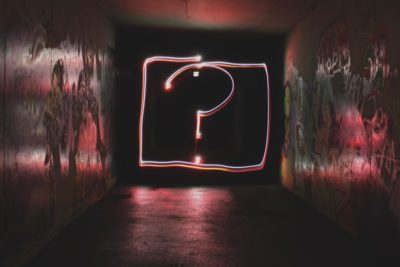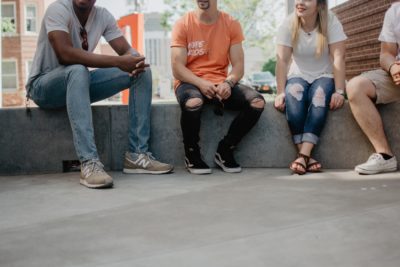Why Self-Awareness and Vulnerability are Important for Self-Growth
Many of us wake up thinking, “Today. Today I’m going to be better!” Then we plan our self-growth for the day around focused intentions and specific “how-to” Pinterest articles. If you’re like me, you might even try to tackle one topic at a time. (Once I’m more self-aware, then I’ll try to discover my strengths, then I’ll work on my vulnerability.)
The thing is, some elements of your self-growth journey can’t be separated. In particular, self-awareness and vulnerability need to go together.
Why is this the step you’ve been missing from your self-growth?
You see, self-awareness and vulnerability are profoundly intertwined. You can’t improve one without the other. Because we neglect this connection, many of us get stuck in our self-growth journeys.
Imagine if you tried to drive a car only using one hand at all times. Sure, you could cruise pretty well with one hand on the steering wheel for a straight-away. But when you needed to start hitting that turn signal or shifting gears (or flashing your high beams, if you want to get really crazy), it’d become a pretty jerky and uncomfortable drive.
Just like you need to use both hands to drive a car, you need both self-awareness and vulnerability to steer your life forward.
.
What is Self-Awareness
What does self-awareness mean? Self-awareness is our ability to identify what we’re thinking, feeling, and doing. Additionally, we can name these thoughts, emotions, and behaviors and better understand the role they play in our lives.
While it might sound simple, self-awareness is incredibly challenging to achieve. Humans are wired with biases and emotional patterns that prevent us from being self-aware. One of our biases even makes us think we’re self-aware when we’re not. (Fun fact: 90% of people believe they are self-aware and only 10-15% really are. Check out these signs to see if you lack self-awareness).
Emotional intelligence self-awareness is just one of many examples of self-awareness.
So why is self-awareness important?
If we’re self-aware, we’re better able to monitor ourselves. We can begin to build our lives in a way that gives us what we want and need. And, if we’re lucky, we can avoid or stop the aspects of our life that no longer serve us.
As a result, self-awareness benefits are endless. This is true for both self-awareness in our daily lives and self-awareness in leadership.
.
What is Vulnerability
Vulnerability is perhaps the lesser-known element in the pair. (Kind of like the misunderstood sibling sitting quietly in the corner, if you will). This is, in large part, because our culture has created damaging myths about what vulnerability means.
To define vulnerable, we can start simple. Vulnerability is our willingness to take risks and expose ourselves emotionally to others, even if we don’t know the outcome.
These risks don’t need to be large. Being vulnerable can be something as simple as making a comment or acknowledging uncertainty.
Many of us think about vulnerability in terms of a relationship. Certainly, being vulnerable is essential for meaningful relationships, but it also is necessary for us as individuals. Vulnerability requires courage – a quality we don’t mention enough for self-growth. If you want to learn the meaning of vulnerability and how you can be more vulnerable, check out my series on vulnerability.
You also might want to check out Brené Brown, vulnerability expert. (Sometimes Brené Brown vulnerable quotes can give you the inspiration that you need). The best Brené Brown books include Daring Greatly, The Gifts of Imperfection, Braving the Wilderness, and Dare to Lead. I’ve read all of them and can honestly say they’ve changed my perspective on life and how to transform my relationships.
Why Self-Awareness and Vulnerability are Important for Self-Growth
Which comes first – self-awareness or vulnerability – is kind of like the chicken and egg question. Neither comes first, but both are necessary. Consider where these qualities are missing from your life and what mindset shifts you need to make.
One) You need vulnerability for self-awareness
1. Be vulnerable to ask the questions about yourself not knowing the answers
The whole reason vulnerability is a risk is because you don’t know the outcome. Humans like to be in control. It’s literally in our DNA. (Imagine a caveman in prehistoric times saying, “I’m not too worried about finding food or avoiding life-threatening dangers. Life will take care of itself.”).
Self-awareness, however, requires us to ask questions about ourselves that we don’t know the answers for. We can make educated guesses but hidden beneath complicated and convoluted emotions, we don’t know what we’ll find.
On top of this uncertainty, we also don’t like to be wrong. So much so, in fact, that our brains will receive information differently depending on if it supports us or not.
It takes a great deal of courage and vulnerability, then, to dive into these self-awareness questions to acknowledge the truth. We might not like what we find or feel good about the answers. But we can’t improve our self-awareness without this vulnerability.
2. Be vulnerable to admit your mistakes and shortcomings
If the uncertainty of asking questions makes us hesitate, then the chance to fully acknowledge our mistakes and shortcomings will undoubtedly give us pause. Self-awareness is not a beautiful window into the best version of ourselves (although being self-aware of strengths is incredibly beneficial to our lives).
Examples of self-awareness skills include being able to identify our negative emotional patterns and mistakes. After all, it’s difficult to improve if you don’t know what you need to improve.
We don’t like to be wrong or less-than; it taps into our scarcity mindset of not being good enough. Our cultural narratives make us feel even worse. However, remaining ignorant is not the answer.
We need to be vulnerable and summon the courage to look introspectively at the good, the bad, and the ugly. Only through authentic self-awareness activities can we achieve substantial growth.
3. Be vulnerable to fail and persevere
Another reason many of us lack self-awareness is that we don’t fully understand what self-awareness is. We think it’s a one-time question and answer session. I did the necessary self-awareness tests and now – poof! – I’m self-aware!
Self-awareness is a difficult and never-ending journey. As our lives and environment change, we’re going to continue to evolve. This means that we’re going to fail at being self-aware on multiple occasions. We’ll get better, then we’ll get worse, then we’ll get better again – if we dare to persevere.
We need to summon the vulnerability to keep practicing our self-awareness even if we’re repeatedly bad at it. The definition of vulnerability is taking risks – and persevering through the challenging and uncomfortable self-awareness work is a risk. But, if you understand why self-awareness is important, you’ll know it’s worth it.
.
Two) You need self-awareness for vulnerability
1. You need to be self-aware of myths of vulnerability
If we’ve established that you need vulnerability to be self-aware, you also need to be aware of the meaning of vulnerability. The definition of vulnerability often gets misconstrued. Most notably, it becomes convoluted with cultural myths.
For your self-growth, you need to be self-aware of these myths. They include wrong notions such as vulnerability is weakness, vulnerability is not for everyone, and vulnerability is only for deep, dark emotions. When you buy into these myths, you can’t fully embrace why you need to be vulnerable in your introspective journey.
Self-awareness requires authentic vulnerability. Antonyms for vulnerable do not include bravery and strength. Instead, being vulnerable requires taking an emotional risk and summoning the courage to do so. Other words for vulnerable should include courage, poise, and confidence.
Learn more about the myths of vulnerability here.
2. You need to be self-aware of when it’s appropriate to share and when it’s not
Emotional vulnerability calls you to be willing to share yourself with others. Because we judge ourselves so harshly, we’re afraid that others will judge us too. However, being vulnerable is necessary for creating meaningful relationships.
Self-awareness comes into play when we need to understand when it’s appropriate to be vulnerable with others. The meaning of vulnerability is not full disclosure. Real vulnerability is a cycle of trust and being vulnerable. You need to establish a base level of trust before you can be vulnerable.
Additionally, you need to be self-aware to know when it’s appropriate to share and when it’s not in your relationships. An intimate moment with my close friend can call for an act of vulnerability. A quiet moment at work, however, doesn’t beg for me to reveal my life struggles with my coworkers.
To reap the full benefits of vulnerability, you need to be self-aware of when it will improve your self-growth and when it’s not called for.
3. You need to be self-aware of what it is you’re really being vulnerable about
Since vulnerability means taking an emotional risk, it’s easy for us to get caught up in what those emotions are. If you haven’t caught on yet, humans are incredibly complicated. Furthermore, our emotions make it really challenging to understand ourselves.
As a result, we might not fully understand what topic we’re trying to be vulnerable. Perhaps I want to connect with my partner, but my shame overcomes me, and I end up talking in circles about past family drama. While revealing, this conversation might not get at the real issue I’m trying to convey: my deep-rooted fear of failure.
Self-awareness is necessary to identify what it is that makes it vulnerable for you. It allows us to get at the real issue beneath the waves of emotion and natural defenses. It also allows your find the answers to the questions of self-discovery that you may be asking yourself.
.
How to develop self-awareness and be more vulnerable for self-growth
If you need vulnerability to be self-aware, and you also need self-awareness to be vulnerable, how do you develop them both?
Every time you try to improve your self-awareness, you’re allowing yourself to develop your vulnerability. Lean into these moments. When you feel vulnerable emotions trying to hold you back – such as fear, shame, and anxiety – try to push through them. And, when you feel these defenses go up, try to step back and analyze where they’re coming from. They’re making you feel vulnerable. Remind yourself that vulnerability is a good thing.
Being a vulnerable adult and being vulnerable in relationships should be goals to strive for, not things to avoid. Self-awareness is important and vulnerability is important for you to find meaning in life.
By understanding the role that both self-awareness and vulnerability play, you can intentionally practice both. Ultimately, it can explode your self-growth journey. Click to learn ways you can be more self-aware and ways you can be more vulnerable in your everyday life.
For a huge resource of transformative tools that you can use for your personal growth, check out Trans4Mind’s page of Tools For Transformation.
.
Conclusion
Many of us try to improve ourselves but fall short. Often, this is because we don’t understand what we need for self-growth. Self-awareness and vulnerability are two crucial elements for self-improvement. They can’t exist without each other.
Our self-awareness definition is our ability to monitor ourselves and identify our thoughts, feelings, and behaviors. The definition of vulnerability includes taking emotional risks to connect with ourselves and others, even when we don’t know the outcome.
One) You need vulnerability for self-awareness
- Be vulnerable to ask the questions about yourself not knowing the answers
- Be vulnerable to admit your mistakes and shortcomings
- Be vulnerable to fail and persevere
Two) You need self-awareness for vulnerability
- Self-aware of myths of vulnerability
- Self-aware of when it’s appropriate to share and when it’s not
- Self-aware of what it is you’re really being vulnerable about
Want to start your self-growth journey the right way? Subscribe to this blog and join a growing community of individuals who want to learn more about what we all need to be happy.
.









